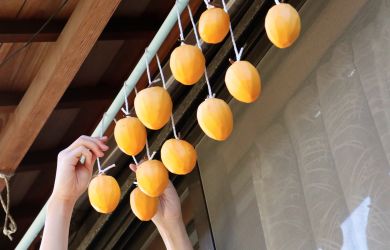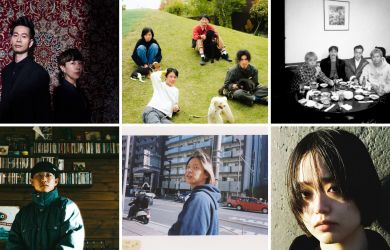
November 19, 2009
Taking Charge
Meet the Tokyo-based entrepreneurs who are riding out the economic storm
By Metropolis
Originally published on metropolis.co.jp on November 2009

KJELL FORNANDER
Age: 60
Hometown: Gothenburg, Sweden
Company: Next Inc., a business-to-business marketing communications firm
Photos by Benjamin Parks
Changing Tack
The wind has long been at the back of Kjell Fornander. From a 1-year-old playing around on yachts off the coast of Gothenburg through his days as a foreign correspondent covering Asia’s hotspots, the Swede has navigated an individualistic course through life. He’s now dropped anchor in Tokyo as the owner of Next Inc., a business-to-business marketing communications firm.
The company, which Fornander started while still a journalist in 1988, provides clients such as Volvo Trucks and Ikea Japan with what he describes as a “one-window solution” of services.
“We do their newsletter, their website, their PR, their advertising—the whole package,” the 60-year-old tells Metropolis at Next’s office in Hiroo. “I’m not trying to be pretentious, but we really are a full-service agency for a very specific niche: middle-sized subsidiaries of large international companies in Japan.”
Fornander started his working life as a features writer for Swedish magazines in the ’70s. After authoring a book on the obscure subject of wooden shipbuilding in Denmark, he was sent to Japan in 1983 for three weeks on a freelance job for a travel publication.
“I saw great professional potential here because I realized that what had been written in Swedish [on Japan] was just bullshit,” he says. “Most of the books had been written by academics or housewives of Swedish expats. They wrote about Japan’s beauty and how mysterious it was—nothing for my generation of independent travelers.”
In 1987, after writing his book, he began working as a stringer for Aftonbladet, Sweden’s biggest daily, and over the next decade covered events like the fall of South Korea’s military dictatorship, Tiananmen Square, the Kobe earthquake and the Tokyo subway gas attacks. But financial reality and the birth of a son forced Fornander to change tack.
“After the Berlin Wall came down in ’89, the journalistic focus [in Sweden] moved from Asia to Europe. In ’93, the Swedish currency was devalued by 30 percent, there was a major recession and papers lost advertising revenue,” he says. “Overnight, I became 30 percent more expensive and no one was willing to pay for stringers in Asia. I wondered how I would pay for my son to go to international school… I started focusing more on the company.”
After 10 years of growth, Next Inc. has been hampered by cuts in its clients’ communications budgets this year. Fornander predicts that in 2009 his company will generate a third less revenue than last year’s figure of ¥310 million, and the boss has acted decisively to weather the economic storm.
“Eighteen months ago, we had 23 people; today we are 15, with three of them part-timers,” he says. “I believe I acted in time to save the company. We’ve scaled down so we are still operationally profitable. It’s been a case of looking under every stone, saving ¥5,000 here and ¥500,000 there.
“In 2011, we’ll have new clients and our existing clients will come back in full force,” he adds. “As we are sitting with low costs, we’ll have leverage and become very profitable.”

MATT ALT & HIROKO YODA
Ages: 36 and 38
Hometowns: Washington, DC and Tokyo
Business: AltJapan, authors, specialists in videogame and entertainment localization and TV production
Dynamic duo
Many people dream of becoming sportsmen, actors, musicians, artists or writers—doing something they love and getting paid for it. But for Matt Alt and Hiroko Yoda, a bicultural, bilingual husband-and-wife business team, this vision is far from a fantasy—even if some of the videogames they work on are.
“I know this sounds trite,” Alt tells Metropolis, “but I really believe you can’t truly become successful at something unless you enjoy it.”
Alt and Yoda’s company, AltJapan, produces the English versions of Japanese videogames and other media like manga, anime and film. They don’t simply translate the scripts; they arrange studios, directors and actors for the voiceovers, and provide quality assurance—matters such as making sure dialogue matches up with the movement of the characters’ mouths on screen.
The couple has also authored several books based on their otaku-esque interests: Hello, Please! Very Helpful Super Kawaii Characters from Japan (Chronicle Books, 2007) and Yokai Attack! The Japanese Monster Survival Guide! (Kodansha International, 2008). They have another publication planned for next year.
The couple met at a party in Maryland and married in the late ’90s. At the time, Yoda was studying for her Masters in international conflict resolution and Alt was working for the US Patent and Trademark Office as a technical translator. The seeds of AltJapan were sown when a translator friend of Alt asked him to take on a videogame script. The couple worked together on it, and soon received a flood of offers for similar work.
AltJapan incorporated in the United States in 2001, and Alt and Yoda relocated to Tokyo in 2003 after Alt quit his government job—a move he describes as “one of the single most liberating days of my life.”
The couple is still very much emancipated, and this freedom means no two working days are alike.
“We might be slaving over our keyboards on a translation job for a videogame developer,” Alt says, “or delving through microfilms or musty books in a library doing research on a new book, or out in the field shooting photographs for a magazine article or field producing a television segment.”
After years of steady growth, AltJapan’s revenue has fallen this year. Yet the sanguine Alt sees opportunity amid the downturn.
“I’ll be honest, it’s been rough—rough for everyone in the game industry. We’ve seen a significant drop in the number of projects offered by game developers,” he says. “However, the recession has been a great excuse for us to try things that we wouldn’t have been able to justify spending time on… Some of those have turned into new, potentially lucrative revenue streams.”
Sometimes the pair has differing views on how they should approach assignments, but Yoda knows what makes them a successful combination.
“The bottom line is that we respect each other,” she says. “We have a sense of our own weak points. That is really critical—knowing your weak points as well as your strengths, so you can compensate for them or work on them.”
Or, as Alt says about the secret of AltJapan’s success: “Teamwork, baby!”
Fountain of Knowledge

YURIKO MIYAZAKI
Age: 51
Hometown: Tokyo
Business: Krene KK, human resource development and organizational development consulting company
Yuriko Miyazaki believes that all companies have reservoirs of untapped potential—and it’s her job to help loosen the faucet to allow it to gush out. Her company Krene (which means “fountain” in Greek) works closely with businesses on an organizational basis to try to change preconceptions on the part of both employees and management.
“Japanese companies used to be run by Japanese men who went to good schools, but many other people with potential work in these companies,” Miyazaki tells Metropolis over coffee at the Foreign Correspondents’ Club of Japan in Yurakucho. “They don’t leave their jobs, but [they also] don’t make full use of their minds or their talents. Companies can’t survive unless they are innovative. Japanese companies used to think Japan was a special entity and they would always be OK.”
A former corporate employee herself, Miyazaki worked at a training company for four years. While there, she dealt with everyone from freshmen to board members, leading courses on topics ranging from business strategy to creative thinking.
“That company taught me that ‘training is not giving knowledge, training is facilitation,’” she says. “While people said that the two-day courses [we gave] were great, nothing really changed in the companies we worked at.”
It was this desire to make a practical difference that moved Miyazaki to enroll in an MBA program at Temple University’s Tokyo campus. And while her life did not literally begin at 40, she certainly took a huge plunge at that age, establishing Krene at the same time as studying for her master’s.
“It was really tough,” she says. “Temple is for businesspeople, so everyone worked during the week, and had study meetings on weeknights and classes on weekends. “
Miyazaki works on a project basis, putting together teams to liaise closely with client companies on holistic consulting programs in areas such as hierarchical management, career development, interpersonal communication, customer satisfaction, total quality management, cross-cultural communication and empowerment of female employees.
While Miyazaki had been flat-out in the decade since Krene’s creation, she found herself with time on her hands earlier this year.
“Projects were postponed and canceled after last year’s [economic] shock,” she says. “I was relatively free until around April, so I took this opportunity to study. Then in August, I got really busy. The same jobs didn’t come in—just more challenging jobs with short delivery periods. It’s been tough, but I’m working hard to get to the next stage with clients.”
Miyazaki is also philosophical about the opportunities these hard times present.
“The recession doesn’t just affect me, but everyone. That’s why times of change are a time of business chances,” she says. “I try to look out for chances. As a consultant, I just focus on my customers so I can be of use to them.”
Hop, skip and jump

KIYOTAKA MARUYAMA
Age: 31
Hometown: Tokyo
Company: Japan Hopper, travel and information website
Every summer, hedonistic Northern European tourists head en masse to tour around the picturesque Greek islands and char themselves to tones more associated with pickled beetroot than skin. But Kiyotaka Maruyama’s vision of island hopping over the Japanese archipelago takes on an entirely different hue.
“I want to help people in [rural] areas open up their locales to foreign visitors,” says the proprietor of Japan Hopper. “I want to help them use the internet better. For example, there is little information on Tokushima in Shikoku. So I see my site as a tool to showcase these places to the world.”
Japan Hopper is a mix of user-generated information, articles from paid contributors, and advertisements from places like ryokan and hotels. Users have contributed reviews, blogs and general ramblings on about 3,300 locations—places to stay, outings, bars and restaurants. Maruyama believes his site provides visitors with a greater depth of updated information than they would find flicking through the pages of the big-name guidebooks.
“On foreign websites, I saw that Japanese culture like anime is popular, and there was a demand for a service to help foreign visitors understand our culture,” Maruyama tells Metropolis in a coffee shop near his cramped Minami-Aoyama office. “There’s also a lot of information that doesn’t appear in Lonely Planet and other guidebooks—that great standing soba shop under the Shimbashi arches, or an onsen hidden away in Gunma Prefecture.”
While working at an online advertising agency, Maruyama saw how underdeveloped internet marketing was for the gaijin sector and started carving out his niche. The native Tokyoite presented his company with a plan to build an e-commerce site for foreigners, but they declined, saying it wouldn’t bring instant profits. He then made what was more of a leap than a hop by quitting his job and establishing what he calls his “micro-venture” in October 2005.
Japan Hopper generates income solely through pay-per-click advertising. It gets an average of about 100,000 hits a month, drawing monthly revenue of around ¥1 million. It is also backed by the Ministry of Economy, Trade and Industry IT division. About 70 percent of users are overseas visitors to Japan, with the remainder mostly consisting of foreign residents.
Maruyama has his fingers in several other entrepreneurial pies. His website-building skills are in demand, and he’s creating an e-commerce site to trade Japanese cultural products such as anime and other secondhand goods. He will also publish his first book in December—a guide to e-commerce planning.
While his one-man band has marched through the recession, albeit with a drop in advertising revenue, Maruyama is eyeing expansion and in June set up the World Hopper site, a similar concept to the Japan service but with a global network of contributors. Confirming his view that his sites get off the beaten track, one of the top recent contributions was an article on the eastern English city of Peterborough—a place you would never see in the glossy brochures on stands outside travel agents.
World Hopper: www.world-hopper.com. Japan Hopper (English): www.japan-hopper.com.
Balancing act

JUNGAE LIM
Age: 35
Hometown: Tokyo
Business: Amapro, communications agency
Many working women juggle work and family life, and while expectant mom Jungae Lim is no exception, she’s actually set up a business to provide opportunities for mothers and other time-strapped workers to find balance in their own lives.
Lim founded Amapro in 2006 after realizing she wouldn’t be able to cope with the dual role of book editor at the Nihon Keizai Shimbun and mom to her first child, Remina.
“I worked in media for seven years. It was very enjoyable, but I had to work really late at night. Often I’d get a taxi home at around 3 or 4 in the morning,” Lim, 35, tells Metropolis at her Roppongi office overlooking Tokyo Tower. “Many women, especially mothers, quit working in the media because of the long hours, and find it difficult to return to the field without working full-time.”
Amapro, a fusion of the words “amateur” and “professional,” provides freelance opportunities for workers with writing, editing and translation skills. The company has about 60 “amapros” on its books, serving clients like the Nikkei, a business coaching company, consultancy firms, and an advertising agency. About half its business is paper, half online.
Lim, a third-generation South Korean resident of Japan, joined British Airways as a flight attendant after graduating from a school for Korean children and Tsuda College, a private institute for women in western Tokyo. On one of her frequent trips between Narita and London, she met a book editor who persuaded her to quit her high-flying career and join a publishing firm. She worked there for three years before moving on to the Nikkei. She now has the opposite problem to the one she faced in her editing career.
“When I worked as a book editor, time was limitless, but now my time is restricted. I have to fit everything into my working day,” Lim says. “I take my daughter to nursery school around 8:30am and come to the office around 9:30am. I work until about 6, pick up my daughter, and spend time with her at home at night.”
Amapro, which Lim runs with one part-time staffer, pulls in revenue of about ¥20 million a year. It has held strong in the recession despite the cancellation of several assignments.
“Last year, lots of companies made inquires to us about work, such as creating newsletters or writing community websites,” Lim says. “But at the beginning of this year, these firms said things were tight and suspended the projects. However, we still have our regular jobs, and things have been OK so far.”
Perhaps it is Lim’s attitude to work that has helped the agency pull through and will enable her to reach her target of getting 100 “amapros” onboard.
“A president of a small company told me that if you get a job, you should do that job sincerely,” she says. “If one client is satisfied, then they’ll introduce other clients too. New clients are important, but if you do the work at hand well, then business will expand gradually.”





